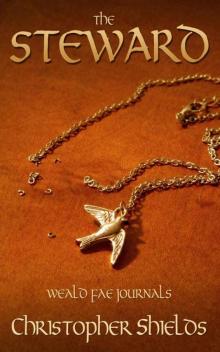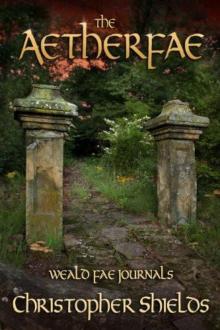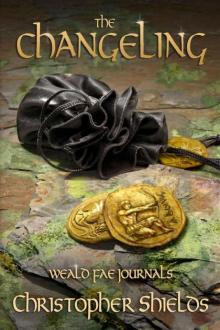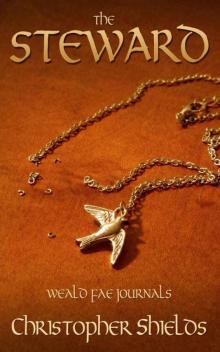- Home
- Christopher Shields
The Steward Page 2
The Steward Read online
Page 2
The second morning of our arrival to the Weald, I explored the mountain with Mitch despite nearly freezing to death in a puny windbreaker and struggling with a persistent runny nose. At the top, after following an old trail with stone stairs through the bluffs, I accidentally found the caretaker’s cottage—and the caretaker. The pockmarked old man with thin, creepy hair, deep lines, and cruel, cataract-filled blue eyes startled me. Chalen, he called himself, invited me to stay and look around the weed-choked gardens. He creeped me out, but when I attempted to leave he glared menacingly at me and insisted I stay.
That night I thought I saw him through my bedroom window, staring at me from the woods. When I blinked he vanished. Then, moments before I saw the wolf for the first time, I saw Chalen again, watching me from atop a bluff. He didn’t smile—he just stared, sending chills down my spine. Something else in the woods terrified me even more, though: the sensation of being watched, of unseen eyes tracking my every move. I couldn’t shake the feeling that something deep in the shadows, hidden behind the trees, wanted me to leave this place. My gut told me that whatever it was would hurt me if I stayed.
As I stared nervously at the front door, sweat ran down my forehead and my t-shirt felt soaked against my skin. My fingers fumbled with the zipper on my new coat. Air—I need air.
Justice lifted his big head off the floor and wagged his tail, stirred by my sudden movements. But after losing interest in watching me hyperventilate, he put his head back down and waited for me to finally open the door.
He had been with me when I met Chalen. He even growled when Chalen moved closer to me after I said that I had to take Mitch back to the cottage and couldn’t stay. Then there was the Voice. When Chalen became hostile, I heard a woman’s voice in my head telling me to leave. It was clear and distinct. So when a small Blue Jay began dive-bombing Chalen repeatedly, I used the distraction to make a hasty retreat. It all seemed surreal at the time. If I could find that bird, I’d take it and Justice with me to the cave.
Sitting on the stairs, refusing to even touch the front door, I grew angry with myself—angry that I continued to put off the inevitable. I’ve been angry a lot lately—not at all my usual self. I’ve always hidden my emotions, bottling them up just like my father did. I’ve even managed to keep my emotions in check for the last few days—difficult to say the least. But that was before the reality of my promise set in. I thought about the meaning of that day, and why the things that Aunt May had said compelled me to head out that door, into the woods, with Justice.
The day after my run-in with Chalen, Aunt May had been fidgety, even nervous, and asked me to stay with her while my parents were gone. It seemed like a good idea at the time. The last thing I wanted to do was spend the day in the tight confines of the SUV with my parents. No one deserves that.
I stood, staring at the heavy wood front door, and zipped my coat back up. I’ve really got to just do this. Oh, god.
It wasn’t that I believed Aunt May, but after the last two weeks I didn’t disbelieve her, either. That morning, after my parents left, Aunt May had hobbled on her cane back to the kitchen and asked me if I wouldn’t mind talking with her over tea. Darjeeling. While she clanked around in the enormous room, filling a copper kettle with water, she talked about brewing tea properly. I didn’t see the point, really—I preferred to nuke a teabag and call it good enough. I watched her, though, and listened. She seemed to need that most.
Aunt May settled into one of the large leather armchairs in the keeping room, stoked the fire, and then set the trap—the one that had me quivering at the front door. She stared for a minute at the gold-orange glow of the embers, at the flames dancing around the edges of the charred logs, before she spoke in her thick Ozark accent. “Maggie, ya seem ta be strugglin’ with the move more’n the rest of yer family.”
She was right, of course, and it embarrassed me that she noticed. As I brought the tray holding the tea set and cups to the table nearest Aunt May’s chair, I told her that I was happy in Florida. I said that it was nothing against her, but I didn’t want to leave.
“I know ya were happy.” She leaned forward and placed a tiny strainer over my cup before pulling the infuser out. “Don’t wanna over-steep the tea.” She let it finish dripping into the pot for a few seconds before she placed it on a saucer. “Looks perfect.” She then poured a stream of hot brown liquid into each cup, filling the room with a rich, woody aroma. “I hate ta see ya sad, Maggie, but I don’t hate that yer here.” She smiled, but her lower lids were pushed up, punctuating her brown eyes with wide crow’s feet that matched the deep furrow pressed into the wrinkled skin above her nose.
Though typically carefree, telling one story after another, the worry that deformed her face was a telltale sign that things were about to go badly—one that I didn’t recognize at the time. Instead, I assured her that I was fine, that I just needed some time to adjust to Arkansas. She assured me in return that I’d make a lot of new friends. “Yer funny, pretty, and smart—that’s the triad of popularity right there,” she said.
“Ya trust me?” she asked next.
I remember nodding.
“Unquestionably?” She asked, grinning, just showing her teeth while pulling back a handful of crazy gray-black hair from her forehead.
“Unequivocally!” I countered, managing a smile.
Aunt May feigned a stern look and glanced over her glasses at me for a moment. She removed the strainers and poured a little stream of cream in each cup. After adding two sugar cubes, she lifted her cup and saucer to her lap and stirred it slowly. I did the same and took a sip.
“Okay, this is the best tea I’ve ever had,” I admitted.
“I’m glad ya like it. Ya know I wouldn’t intentionally lead ya astray,” she said. A deep furrow once again formed just above her nose, and she flexed the fingers on her free hand before rolling them into a tight fist.
“Aunt May, what is it? Please, you can tell me.”
I had spoken those words with the best intentions, but with my journey across the woods and into the cave awaiting on the other side of the front door, the cold side, I wished I could take them back.
“I know I can, Girlie Girl. I’m just not sure how,” she had said.
Her smile turned to a slight frown that deepened the lines around her mouth. “I’m afraid you had to come here, Maggie. There really wasn’t any choice. I’m also afraid it’s completely unfair to you—more unfair to you than to anyone else.” All the typical inflections in her speech were subdued—she held them at bay.
“How so?” I finally asked.
“Because I’m about ta ask a lot-a ya. I’m about to ask ya ta do somethin’ that, by all appearances, ya won’t wanna do. That’s how,” she said, her inflections returning. May took another sip of her tea and looked back at the fire. “Ya prob’ly guessed that I’m not doin’ so hot?”
She caught me off guard with that one. So I did what I imagined most people do when someone older talks about dying … I denied the obvious and deflected. “Aunt May, I think you’re going to be around for a long time, especially now that we’re here to help you.”
She smiled. The flames caused the shadow of her glasses to dance on her cheek. “I’m optimistic that I got some time left, though ain’t sure how much. But that’s not really my point, Maggie. I’ve had a long, wonderful life. I had a fantastic husband for thirty years an’, while I didn’t have’m as long as I’d have liked, I had a beautiful boy, too. A great life—and I’m not gonna lament on how near the end of it I may’r may not be.” She turned to look at me. “Fact is, I need ya ta do somethin’ for me, Maggie.”
“Sure, anything,” I said quickly. Too quickly.
“Well, ya might wanna hear what it is first, ‘fore ya agree an’ all. I hope ya’ll still feel the same way afterwards.”
“I promise, Aunt May. I will do whatever you ask. I trust you unequivocally, remember?”
Those were the words, I promise, that led me to the bottom o
f the stairs, alone but for Justice—they were the reason I sat quivering by the front door, preparing my head to get on with it. Justice moved to my side to nudge my hand with his cold nose. He was ready to go. I wasn’t. Even though I knew I could make the trek to the cave, and hoped that I could overcome my claustrophobia once inside, I seriously doubted the effort was even worth it.
According to Aunt May, I had to come to Arkansas because I was selected to be the next Steward. That, she had informed me, was a human liaison to the original inhabitants. I thought she was just spinning another Ozark tale when she told me that the original inhabitants were Fae. She claimed that they were immortals who lived on the Weald, as well as in similar places all over the world. The Fae and our family, she explained, had struck a deal in 1826 when my ancestors settled in the valley fresh off the boat from Ireland. Pete O’Shea, the first of my family to become a Steward, had made an agreement with the Fae to keep the tract in one piece in exchange for a comfortable life.
Though Aunt May did appear to be very well off, I just couldn’t believe that her wealth had anything to do with fairies. While she explained that there were many clans of Fae, I began to wonder when she’d get to the punch line. She never did. She claimed that I’d be working with the most powerful clan, the Seelie, and she told me that they could manipulate the elements. She also warned me that one clan in particular, the Unseelie, was dangerous, but that I’d be fine if I followed a few simple rules. The most important of all was to keep their existence a secret. Oh, don’t worry, Aunt May, I don’t think I’ll be spreading the word about this anytime soon—or in a million years.
I realized she wasn’t trying to prank me when she led me to the stone gazebo. The structure was unique from the rest of the cottage. Centered in the glass-enclosed, copper-roofed breezeway, it stood between the main cottage and the small separate cottage that contained my parents’ bedroom. Worn and weathered, the tall, domed gazebo appeared much older than anything else on the Weald. Carvings in the stone walls contained four intricate, triangular symbols, each representing one of the cardinal elements: Earth, Wind, Fire, and Water. It all seemed too elaborate for a simple prank.
Even though I silently questioned her sanity, I finally asked what I had to do. Once again, I couldn’t seem to leave good enough alone by just letting her tell her story—I had to go and volunteer.
Aunt May got even more serious. She told me what I had to do: for each element, I was to take a trial that the Fae would administer. She handed me a triangular amber stone as she explained the symbol for the Earth Trial. For it, I was supposed to climb down the bluff to the caves, find the Earth Sign, and place the stone inside.
“The secret ta the first trial’s in the caves, Maggie,” she said.
Nothing else she told me that day really registered. The word cave was enough.
I didn’t believe her at the time—it was impossible to believe her. It was all too crazy. But I also couldn’t shake the feeling of being watched every time I’d gone outside since then, or the feeling I had as I stared at the front door. I’m not a coward! This may be a complete waste of my time, but I’m doing it. I made a promise!
Justice sprang to his feet when I pulled the door open.
TWO
THE PASSAGE
The door shut behind me and I felt the oppression bearing down on my chest. Without glancing above the stone wall that encircled the cottage garden, I followed Justice to the iron garden gate. The garden was large—a vast expanse of dormant vines and shrubs—easily the size of a baseball field.
Ten days ago, our chore list had also led us to that very place. There was no shortage of chores at the Weald. Aunt May had been too feeble for too long to keep the cottage garden in good order. She spent the morning telling stories about the property—it was like a historical propaganda reel that played continuously as Mitch and I took wheelbarrow after wheelbarrow of debris to the compost pile.
I didn’t want to think about the compost pile. That was where I saw Chalen watching me. And where I saw the disappearing wolf the first time.
Situated at the end of the peninsula, with Beaver Lake on three sides, Aunt May’s Cottage was odd and quaint. Slightly crooked and seemingly haphazard, the walls were made of random stones in shades of mostly browns, with faint reds, oranges, blacks, and greens mixed in. The tall roof was shingled in dark, smoky plum tiles, with two steeply pitched gables protruding from the front. The kitchen was under one, and my bedroom, above Aunt May’s, under the other. The roof flared out, curving at the eaves. The front door—thick wood-planks with a round top and broad iron hinges—was set under a smaller gabled roof that met the eave in a more pronounced curve than the main gables. Four chimneys, each much taller than the roof, appeared to defy gravity. Also made of stone, the chimneys were stacked so randomly that they twisted and undulated up to the elaborate chimney pots on top. My storybook prison—the garden, my cellblock.
Justice wagged his tail, eager to begin our hike. And to think, Aunt May said poodles were the smartest dogs.
After slinging the backpack over my shoulder, I trudged through the gate and past the small stone studio that stood just beyond the wall. Mom and I had already spent a lot of time in there, too. Yes, more chores. The Weald was like a work camp. Those chores, however, held a special significance for Mom.
Though I wasn’t at all happy with her decision to move here, I did understand it. Mom was an artist, a very good one, and she hoped to make a living at it in Arkansas. Eureka Springs was full of artists and galleries, and apparently the art scene drew people from all over the country. Dad found a job, and we lived with Aunt May for free, so for the first time in her life Mom could focus on her art.
Like every other building on the peninsula, the studio was stone, but unlike Aunt May’s cottage it looked positively medieval. It had three octagonal rooms joined together in a triangle—the walls thicker and wider at the ground than at the roof. Deep set diamond-paned windows and a steep roof covered in slate tiles of a dozen dark colors added to the cozy “built in middle-ages” quality.
For hours we had stacked boxes—in silence. We uncovered the kiln, and arranged more paints and glazes throughout the rustic interior than I could keep track of. A little guilt welled up in my chest for having given Mom the silent treatment. To be honest, though, it didn’t work. Underneath a little dust, her olive skin glistened that morning. She was stunning when she was happy, and I couldn’t remember seeing her happier. Mom was beautiful, exquisite actually, with long black hair, big brown eyes, and elegant features. Fortunately what everyone said was true—I did look like her. Half-Cuban and half-Irish, Mom brought a fiery passion to her art. Though I didn’t want to admit it, Mom’s passion had rubbed off on me. Not an artist, but I was passionate about swimming.
As Justice and I approached the woods, I tried to think about anything other than the cave—all dark, tight, damp, and full of creepy crawlies. In the movies, bad things always happened to people who had wandered into caves by themselves. The tingling sensation of panic stirred in my stomach, making me wish I had eaten less for breakfast. I paused for a moment and concentrated on keeping my imagination in check. Aunt May needed my help, if any of this was believable, and I was the one who had to help her. Nobody else could.
Past the initial line of trees, the feeling of being watched returned with a vengeance, sending my heart into spasms and causing me to twist my head to scan the woods behind me. Twice I nearly went back to the cottage to lock myself inside—but Justice was with me. His company gave me just enough confidence to keep hiking. If he growled even once, though, it would be a footrace to the garden wall.
The large stone barn, down and to the left of the garden, was the last building to disappear from view behind the wooden claws of the forest as I made my way deeper into it. Refusing to think about what lay ahead—or what lay in wait—I forced my mind to concentrate on the barn—the Toy Box, as Aunt May had called it.
I had been in that building, to
o. Aunt May showed it to us the morning we cleaned the garden of all the dead vegetation. Inside it, over thirty cars, two boats, and … a horse drawn sleigh—my great grandfather’s collection of toys—were all preserved. Mitch was ecstatic, giving him one more reason to love Arkansas. His excitement reached a fever pitch when Aunt May pulled the cover from Dad’s old dark green Mustang fastback. With the exception of one tiny pink car, an old Thunderbird, I was ambivalent. It wasn’t an act, either. If she would’ve rolled back the large doors to reveal a pool and the smell of chlorine, things might have been different. But the smell of gasoline did nothing for me. Nor did a barn—Toy Box—full of cars made in the twentieth century.
Deeper in the woods, Justice and I climbed the first set of stone stairs. The narrowness of the pass through the massive, rounded gray rock reminded me that I was about to enter a cave. Much narrower, much tighter, the images creeping into my head weighted my legs and unsettled my stomach even more. Think about something else.
On a branch just ahead of me, to the side of the bluff passage, my little Blue Jay sat watching. Skiiid-li-do, Skiiid-li-do, it called to me. My mind quickly converted its song to, you-can-d’it, you-can-d’it.
“Well, maybe I can do it if you go with me,” I joked.
Above the bluff line, maneuvering between the ranks of gnarled oak and hickory columns, my new tiny blue friend fluttered from one branch to the next along the trail. It must have a nest nearby.
My chest felt less constricted. Breathing a little more normally, I picked up the pace. Justice bounded along beside me, obviously happier to make haste than I was. The worn path led us up the hill and to a fork. The trail to the left led to the bluffs a quarter-mile away. To the right, the caretaker’s ragged cottage—and the caretaker—sat just out of view at the top of the hill. Nerve endings throughout my body reacted, tingling, making me wary of being this close again. “Don’t think about it, dummy,” I whispered.

 The Maebown
The Maebown The Steward
The Steward Weald Fae 03 - The Aetherfae
Weald Fae 03 - The Aetherfae Weald Fae 02 - The Changeling
Weald Fae 02 - The Changeling Weald Fae 01 - The Steward
Weald Fae 01 - The Steward THE MAEBOWN (Weald Fae Journals, Book 4)
THE MAEBOWN (Weald Fae Journals, Book 4)